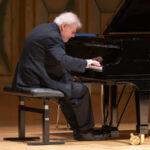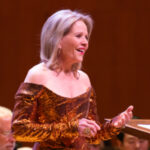February 19, 2021
recorded at LiteraturHaus, Copenhagen
Presnted by Schwartz Center for Performing Arts
MOZART: Quartet No.16 in E♭ majpr, K. 428
Nordic folk-sing arrangements
Karl Henning | 22 FEB 2-21
On Friday, 19 February, Emory University’s Schwartz Center Virtual Stage hosted the Danish String Quartet (Frederik Øland and Rune Tonsgaard Sørensen, violins; Asbjørn Nørgaard, viola; and Fredrik Schøyen Sjölin, cello) in a program split between Mozart and arrangements of Nordic folk tunes. The concert was filmed in December at the LiteraturHaus, an old church in Copenhagen’s Nørrebro district which now hosts diverse cultural events.
My ears’ introduction to the Danish String Quartet was their excellent recording of the Hindemith string quartets (in general, unduly underperformed, especially compared to the well-represented masterly 20th-century quartet cycles of Bartók and Shostakovich). So the Danes were on my good side just by virtue of their choice of repertoire.
But of course, not solely that, because they are an outstanding ensemble. Then (again, for my ears) came Nielsen.
I’m a clarinetist, and Nielsen, as arguably the composer of the finest clarinet concerto to enter the repertory since Mozart, is perforce something of a hero. The Danish String Quartet figure prominently in Da Capo’s 6-CD box, Nielsen: The Masterworks, Volume 2 (Da Capo 8206003) especially (but not solely) four string quartets. Nielsen, like Hindemith, was a violinist, so suffice it to say that his writing is always idiomatic. If Nielsen’s quartets do not rock the musical world (as did Bartók’s) they are capably written, and those who enjoy and appreciate Nielsen’s compositional voice are grateful to the Danish String Quartet for this survey.
The standard repertory on Friday’s “virtual concert” was Mozart’s Quartet in E-flat, K. 428, one of the set of six he dedicated to Haydn, as they owned homage especially to Haydn’s Opus 33 quartets, published by Artaria in 1781 — the year that Mozart arrived in Vienna. The prodigious Mozart’s facility in composing is justly legendary: he would compose music mentally while he was playing billiards.
The Overture to the opera Don Giovanni, which would open in Prague on 29 October 1790, was in the composer’s head only until the evening of 27 (or possibly 28) October, when well after midnight, Mozart sat at his desk and set to writing with his wife, Constanza keeping him awake with punch, and by reading poetry to him. There being no time to draught a full score, he wrote out all the individual parts (A copyist was hired at 7AM).
The reason I retell this story is for context. Mozart wrote his six “Haydn” quartets from 1782 to 1785, so we have some indication that Haydn’s example here had prompted the younger composer to “up his game” in this set. Mozart composed the K.428 in June and July of 1783. Especially in the first movement (Allegro non troppo) and the second (Andante con moto) there is an ingratiatingly easeful chromaticism which helps to distinguish this quartet among Mozart’s works. The Danes played magnificently, with grace and warmth.
The second part of the program consisted of arrangements and adoptions of folksongs heard by members of the quartet in Sweden and their native Denmark. First were some compositions/arrangements by the cellist, Fredrik Schøyen Sjölin: a Swedish song, “Shøre” and a Polka from Dorothea. Is Dorothea a musical work or a person? we do not yet know. The final Sjölin selection was “Naja’s Waltz.” There then followed three Danish traditional tunes: “Æ Rømeser” from (if I understood aright) the island of Fyn, of a somewhat wistful character; “Five Sheep, Four Goats” was a light dance at a graceful gait; and concluding with “The Dromer,” vigorous and rather reel-like. ■













.png)